#amnesty critical
Explore tagged Tumblr posts
Text
Just started watching ep. 118 (yes I know I'm behind, I've been busy playing Prey and writing essays on Octavia Butler with life) and in listening to Ludinus' monologue I had a thought about a specific disconnect that cause many, in universe as well of out of it, to view the gods as tyrants. Imogen points it out when Ludinus laments about his family being collateral damage in the battle between the Lawbearer and the Crawling King: would he rather the Crawling King have been unleashed on the world to wreak havoc uncontested? (to which his response was a long silence and glaring at her)
It’s an inability to understand and accept the true scale and nuance the gods operate on, and in doing so choosing to place individual suffering and slights over ultimate consequences that may, and often do, affect the entire world. Yes it’s horrible that the gods struck down Aeor - but they were defending themselves against a weapon of mass destruction, and any other action would have been akin to lining themselves up to be shot. Yes it sucks that the Titans, who were there first, were killed - but they were trying to exterminate all mortals. Yes the deaths during the Calamity were unforgivable - but the alternative would've been to let the Betrayers kill everyone. Yes it’s horrible that the primes wouldn’t let their champions oppose Lolth in taking Opal - but they are in the middle of a battle for the world in which all hands are needed, and losing champions to a minor skirmish when they want the same thing would be pointless. Yes it’s unfair that the gods won’t personally step in and help every little person suffering, such as Ashton and Laudna - but they're literally gods responsible for the lives and afterlives of millions, and also separated by the Divine Gate, which was literally erected to protect mortals from the fallout of too much divine meddling.
When pressed, Ludinus switches to saying that it isn't the collateral itself that is the problem, but that the gods won’t personally remember and beg forgiveness for every single life lost. In saying this, he also claims that he is different - but is he? Does he honor the lives of Orym's family? The children tortured under Trent and other suffering caused by the Cerberus Assembly? The thousands lost in the war between the Empire and the Dynasty because he wanted his own beacon? The entire city of Molaesmyr? Does he even remember the many individuals indoctrinated into his cult and lost in the ensuing battle?
In the end, it isn't about collateral, or honoring those sacrificed. It's that he finds his suffering uniquely bad, and his goals uniquely warranted. Only HE (and people who want the same exact thing as him) has the right to make desicions that affect all of Exandria.
#critical role#cr3 spoilers#cr3#nella talks cr#i mention butler early on mostly as a goof but also I've been reading bloodchild and amnesty and xenogenesis#and their themes of how it's impossible to return to an Unsullied Beforetime feel relevant#sure you might think it would be best if the gods Just Were Not Here#but that isn't an option#if the primes leave the betrayers won't happily follow they will kill everyone#if predathos is unleashed the gods Will Defend Themselves and there will be another calamity#if you actually succeed in killing them all with or without massive collateral destruction you'll have a power vacuum on your hands#and figures like vecna and ukotoa will be muscling in#you have to work with the situation at hand and the situation is that the gods are here#anyway i don't have anything to say regarding the choice to let predathos in yet#gott finish the episode first#and possibly also wait for 119 to see where it leads before i settle on any opinions
336 notes
·
View notes
Text
Famous actual play gms and the WoD games I'd like to see them run
Brendan Lee Mulligan- Mage the Ascension was built for this man. It's a game about philosophical arguments where everyone is a wizard need I say more? Listen to him talking about planescape in the promotional videos on the dnd YouTube page and tell me you wouldn't want to see him run mage I dare u
Matt Mercer- Vampire: the Masquerade Matt's sprawling political plots and comfort with a more serious tone would work really well for Vampire.
Aabria Iyengar- Changeling the Dreaming This isn't just because of a Court of Fey and Flowers, though that has shown she has a talent for depicting courtly politics and the fea. I also think that her work on Misfits and Magic really shows the wimsy and imagination she can bring to her worlds. An energy I'd love to see her bring to Changeling
Griffin Mcelroy- Hunter: the Reckoning, Amnesty was the best taz session by far and it was running monster of the week, which on top of the obvious setting and theme similarities also share a philosophy that prepping for the hunt is more important then the fight itself.
#wod#world of darkness#brennan lee mulligan#mage: the ascension#mage the ascension#matt mercer#vtm#vampire the masquerade#aabria iyengar#ctd#changeling the dreaming#griffin mcelroy#hunter the reckoning#dimension20#critical role#the adventure zone#taz amnesty
340 notes
·
View notes
Text
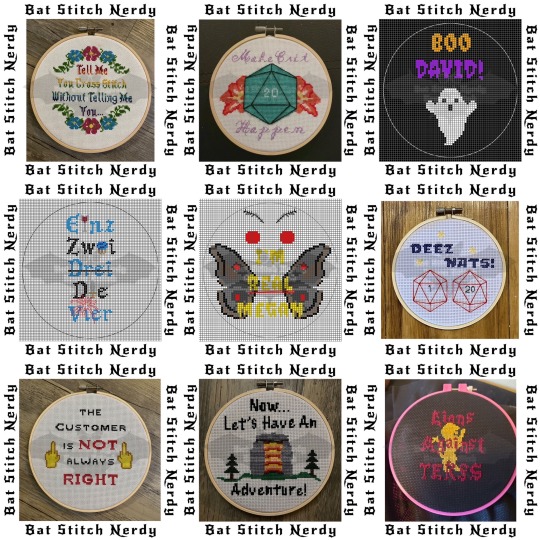
Got a bunch of items on sale for 50% off for the next month! Check them out in my store!
https://etsy.me/3tnX9Gh
6 notes
·
View notes
Text
OOTS is honestly the only good DND-based media, and that includes the game itself.
Dude you have to listen to this DnD podcast the party has an edgy mean lesbian AND a melodramatic twink AND a muscle mommy AND a joke character. And get this: it's not good.
#critical role#baldur's gate 3#baldur's gate iii#baldurs gate astarion#baldurs gate#baldur's gate#dnd#dungeons and dragons#dungeons and daddies#taz#taz balance#taz vs dracula#taz amnesty#taz graduation#ect#oots#order of the stick
34K notes
·
View notes
Text
PAP: Otuaro Holds Critical Meeting With First Phase Amnesty Leaders In Bayelsa, Discusses Sustenance Of Peace, Security, Development In Niger Delta
Highlights His Achievements For The Past 11-Months In Office Today, the Administrator of the Presidential Amnesty Programme, Chief Dr. Dennis Brutu Otuaro, PhD, met with the Bayelsa State First Phase leaders as part of ongoing efforts to foster peace, security, and development in the Niger Delta. During the meeting, the Administrator highlighted his achievements over the past 11 months, which…
#Development In Niger Delta#Discusses Sustenance Of Peace#PAP: Otuaro Holds Critical Meeting With First Phase Amnesty Leaders In Bayelsa#Security
0 notes
Text
Update below original post
The Iranian Regime is going to execute rapper Toomaj Salehi for supporting protests of Jina Amini’s murder by the regime in his songs.
Iranian activist Elica Le Bon says, “Iranians in the diaspora picked up on the fact that the regime tends not to execute people who become known to the international community. We have seen many examples of prisoners that were either released on bail or had their sentences commuted through our “say their names to save their lives” campaign on social media, using hashtags to garner attention for their causes, and even before social media existed, through getting the stories of political prisoners to international media outlets. Once reported on, and once the eyes shift to the regime and the reality of its pending brutality, realizing that the action is not worth the repercussions, we have seen them back down and not execute. For that reason, this is part of an urgent campaign for readers to talk about Toomaj as much as you can, using the hashtag #FreeToomaj or #ToomajSalehi. Every comment makes a difference, and if we were wrong, what did we lose by trying?”
Update: Hey everyone! Toomaj Salehi’s death sentence was overturned! The most recent article I could find says he is still in jail though. Please keep sharing, because people to need to understand what’s happening. According to Amnesty International, Iran carried out 74% of the world’s executions in 2023, not including executions from China since they don’t release those numbers. The execution rate is growing higher with 67 executions in June alone, 48 of which were ethnic minorities despite all together being only 40% of the population. Their crimes are protesting the government for murdering women. Please keep sharing, because while there are many injustices happening far away that can’t be stopped by posting, the Say Their Names to Save Their Lives Movement works.
#toomaj salehi#free toomaj#iran#iranian#jina amini#mahsa amini#woman life freedom#Iranian diaspora#hip hop#rapper#rap#meek mill#feminism#free iran#middle east
32K notes
·
View notes
Text
What makes you react to what's happening in Gaza? and What makes you care about human lives? Is it empathy, ideology, culture, religion, knowledge, or something else that compels you to feel and act?
What would push your government to stop saying, "Israel has the right to defend itself"? What would make columnists stop focusing on self defense and what the demonstrators or students are doing "wrong" and instead use their platform to pressure their government to do what's "right" to stop this ongoing genocide? When did you start caring, and when will you start acting?
Is it when you have Palestinian friends?
When Palestinian children begged for food, safety, and water?
When over 45000 Palestinians had been killed & 98000 injured ?
When left-wing political parties around the world started criticizing Israel?
When Palestinian and Israeli human rights organizations sounded the alarm for years?
When protesters took to the streets every week? Do you still hear their voices?
When human rights organizations like Amnesty International or Human Rights Watch documented the atrocities? Was 60 years of human rights violations not enough?
When journalism associations worldwide recorded an unprecedented number of journalists killed in such a short period?
When UN agencies like the World Food Program or UNRWA reported on the humanitarian disaster and worsening famine?
When aid organizations like Doctors Without Borders or the Red Cross warned of the total collapse of healthcare?
When child rights organizations like Save the Children or UNICEF constantly reported on children’s acute physical and mental health crises?
When Jewish groups like Jewish Voice for Peace declared, "Not in my name"?
When the International Criminal Court in The Hague found strong evidence of crimes against humanity and began prosecuting high-ranking officials? Are you waiting for the court to tell you act?
When your children were upset after hearing what was happening in Gaza? Did that stir your parental instincts?
When the EU's foreign policy chief, Josep Borrell, repeatedly urged Israel to stop the killings?
When your favorite artist spoke out—did that make you reflect?
When students protested at universities around the world? Does the passion of young people give you hope?
When the Pope made a statement about the situation?
When military experts reported how many bombs Israel had dropped on Gaza?
When 2.5 million people were displaced under bombardment, with nowhere to escape in Gaza—a place already called the world’s largest open-air prison even before October 7?
When your employer gave you permission to speak out?
Are you waiting for Joe Biden to say the red line has been crossed and stop sending weapons?
Or are you waiting for Donald Trump to say the magic words: "Enough is enough"?
Or for Benjamin Netanyahu to say "Oh sorry that was a mistake"?
Or are you waiting for God Almighty to come down and say, "Enough is enough"?
Or for the most extreme elements in the Israeli government to say, "Now we can stop bombing"—but will there be any Palestinians left in Gaza by then?
Or will you stop waiting and act now, driven by empathy, knowledge, and solidarity with people who are being oppressed right in fornt or your eyes?
I’ve lost over 200 family members, friends, and neighbors in this genocide. I have 24 of my family’s members and 2 orphaned children, trapped in a makeshift tent and struggling to survive in this freezing winter in Gaza. Is that not enough to move you to act? Tell me then when ?—when will your humanity compel you to step in? Please, act now and donate!
Vetted and shared by @90-ghost: Link.
Verified and shared by @el-shab-hussein: Link
Listed as number 282 in "The Vetted Gaza Evacuation Fundraiser Spreadsheet" compiled by @el-shab-hussein and @nabulsi : Link
Listed on the Butterfly Effect Project, number 957: Link
Additionally, Al Jazeera News has documented apart of my family's case: Link
If, for some reason, you couldn't donate via GoFundMe, you can donate via PayPal instead.
@mesetacadre @forevergulag @gazafunds @northgazaupdates2 @freepalestinneee
@komsomolka @muppet-sex @nabulsi @fading-event-608 @buttercuparry
@prierepaiienne @interact-if @unified-multiversal-theory @inkstay
@socialjusticekitten-blog @socialgoodmoms @nowthisnews @socialgoofy @fightforhumanity-rpg-blog
@fightforhumanity-rp @queerandpresentdanger @90-ghost @timogsilangan @punkitt-is-here
@fox-guardian @hiveswap @valtsv @helppeople @ibtisams
@annoyingloudmicrowavecultist @vakarians-babe @plomegranate @queerstudiesnatural @tamamita
@apollos-boyfriend @akajustmerry @marnosc @flower-tea-fairies @tsaricides
@belleandsaintsebastian @ear-motif @brutaliakent @raelyn-dreams @troythecatfish
@4ft10tvlandfangirl @communistchilchuck @fairuz @sarazucker @fairuzfan
@a-nautilus-as-pixel-art @13eyond13 @stil-lindigo @baby-indie-blog
#palestine#help gaza#facts#yemen#jerusalem#current events#free palestine#gaza#free gaza#palestine news#war on gaza#fuck the idf#palestinian resistance#israel#tel aviv
6K notes
·
View notes
Text
Having mentioned Octavia Butler and cr3 in the same breath, I'm now pondering Bloodchild and its theme of trying to make an inherently unequal power dynamic more equal. In Butler's story, a human living under alien rule negotiates the right to keep a gun, arguing that the alien must 'accept the risk' by letting the weaker human (for whom she cares deeply) keep a weapon that could kill either of them. Whether he is mistreated or not, the human is still less powerful, but the potential of retaliation puts them at more equal ground as they are now both willing to take risks in the relationship.
If Imogen actually manages to control Predathos (not a given), I think a similar re-balancing could be an interesting route to take. Not killing the gods, forcing them away (which would effectively kill the wildmother at the very least), or demanding they 'step down' (lmao what would that even mean, they aren't rulers on thrones who can take off their crowns and redistribute their power, try to think practically here), but giving mortals a place at the table, so to speak. Would the Betrayers be as willing to manipulate their followers and using them to hurt other mortals if Predamogen could pop in and deliver retaliation? Would Vasselheim be as ready to take over communities like Hearthdell if said community could call up the God Eater to effectively make demands in their place? Would the Betrayers consider having another go at wiping out all mortals if the mortals could defend themselves?
In this scenario, the gods could still choose to fight (but seeing as they’ve lost against predathos before, it'd likely be a poor decision) or leave (which, again, isn't an option for all of them). Or they could accept the risk. The primes would have to accept what they couldn’t during the calamity: that their evil siblings genuinely could get wiped off the map if they don’t shape up. In that, they would also genuinely have to choose between what’s best for mortals/exandria or their family (which wasn't an option during the calamity; siding with aeor to kill the betrayers would just have gotten all of them killed).
Of course, this all assumes Imogen can actually control predathos (if she can't, 'the immortal beast can only be killed while in a mortal vessel' would also be a fitting ending, though a lot more tragic). It also assumes the gods (betrayers especially) don't call her bluff and try to fight anyway, causing great losses for both sides. This would only work if they choose negotiation and trust, which I believe the primes would, but the Betrayers? Hoo boy.
#what I'm saying is. let predamogen eat a betrayer or two#cmon we all want to see predathos in action#critical role#cr3#cr3 spoilers#predathos#imogen temult#anyway everyone go read butler#dawn is my favorite of hers but bloodchild and amnesty are good picks if you want short stories that turn your world upside down#I've got a post talking on her works and the myth of benevolent invasions in my drafts#but it'll probably take a while to get around to finishing bc busy#nella talks cr#nella talks books#i mean. kinda
22 notes
·
View notes
Text
This article is from 2022, but it came up in the context of Palestine:
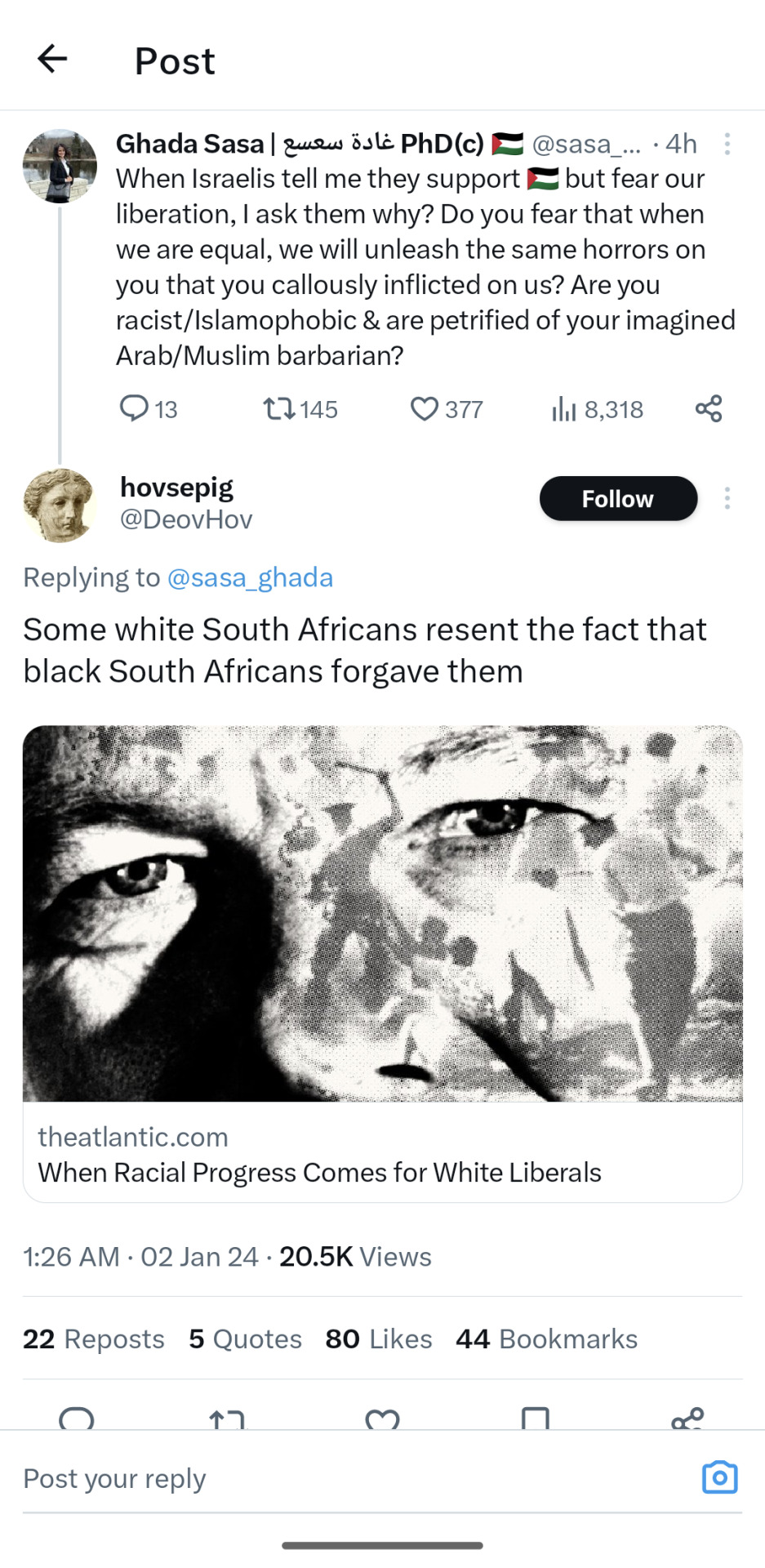
Here are some striking passages, relevant to all colonial aftermaths but certainly also to the forms we see Zionist reaction taking at the moment:
Over the decade I lived in South Africa, I became fascinated by this white minority [i.e. the whole white population post-apartheid as a minority in the country], particularly its members who considered themselves progressive. They reminded me of my liberal peers in America, who had an apparently self-assured enthusiasm about the coming of a so-called majority-minority nation. As with white South Africans who had celebrated the end of apartheid, their enthusiasm often belied, just beneath the surface, a striking degree of fear, bewilderment, disillusionment, and dread.
[...]
Yet these progressives’ response to the end of apartheid was ambivalent. Contemplating South Africa after apartheid, an Economist correspondent observed that “the lives of many whites exude sadness.” The phenomenon perplexed him. In so many ways, white life remained more or less untouched, or had even improved. Despite apartheid’s horrors—and the regime’s violence against those who worked to dismantle it—the ANC encouraged an attitude of forgiveness. It left statues of Afrikaner heroes standing and helped institute the Truth and Reconciliation Commission, which granted amnesty to some perpetrators of apartheid-era political crimes.
But as time wore on, even wealthy white South Africans began to radiate a degree of fear and frustration that did not match any simple economic analysis of their situation. A startling number of formerly anti-apartheid white people began to voice bitter criticisms of post-apartheid society. An Afrikaner poet who did prison time under apartheid for aiding the Black-liberation cause wrote an essay denouncing the new Black-led country as “a sewer of betrayed expectations and thievery, fear and unbridled greed.”
What accounted for this disillusionment? Many white South Africans told me that Black forgiveness felt like a slap on the face. By not acting toward you as you acted toward us, we’re showing you up, white South Africans seemed to hear. You’ll owe us a debt of gratitude forever.
The article goes on to discuss:
"Mau Mau anxiety," or the fear among whites of violent repercussions, and how this shows up in reported vs confirmed crime stats - possibly to the point of false memories of home invasion
A sense of irrelevance and alienation among this white population, leading to another anxiety: "do we still belong here?"
The sublimation of this anxiety into self-identification as a marginalized minority group, featuring such incredible statements as "I wanted to fight for Afrikaners, but I came to think of myself as a ‘liberal internationalist,’ not a white racist...I found such inspiration from the struggles of the Catalonians and the Basques. Even Tibet" and "[Martin Luther] King [Jr.] also fought for a people without much political representation … That’s why I consider him one of my most important forebears and heroes,” from a self-declared liberal environmentalist who also thinks Afrikaaners should take back government control because they are "naturally good" at governance
Some discussion of the dynamics underlying these reactions, particularly the fact that "admitting past sins seem[ed] to become harder even as they receded into history," and US parallels
And finally, in closing:
The Afrikaner journalist Rian Malan, who opposed apartheid, has written that, by most measures, its aftermath went better than almost any white person could have imagined. But, as with most white progressives, his experience of post-1994 South Africa has been complicated. [...]
He just couldn’t forgive Black people for forgiving him. Paradoxically, being left undisturbed served as an ever-present reminder of his guilt, of how wrongly he had treated his maid and other Black people under apartheid. “The Bible was right about a thing or two,” he wrote. “It is infinitely worse to receive than to give, especially if … the gift is mercy.”
14K notes
·
View notes
Text
words for your dystopian novel
Bad situation
abend, accident, adversity, anarchy, apocalypse, backwash, bad scene, bane, bedlam, bind, blooper, bottleneck, bug, bummer, can of worms, cataclysm, catch, chaos, clog, cobweb, collision, commotion, conflict, contempt, crisis, crunch, damage, deadlock, debacle, decline, deficiency, detriment, difficulty, disadvantage(s), disaster, discomfiture, disorganization, disservice, disturbance, downfall, drag, drawback, duress, emergency, error, exigency/exigence, failing, famine, fiasco, fix, flash point, flip-flop, flotsam, friction, gadfly, hang-up, harm, havoc, hell, histrionics, holdup, hurdle, impasse, impropriety, inconvenience, infirmity, jalopy, jump, lapse, limitation, lose, madhouse, malfunction, maze, mire, misery, misfortune/mishap, mix-up, neglect, nightmare, obstacle, onus, ordeal, pall, pass, pell-mell, pickle, pitfall, plague, poison, press, problem, quagmire, question, restraint, reverse, ruin, scandal, scrape, shambles, showdown, smash, snare, spot, storm, strife, syndrome, tiff, to-do, trap, trouble, turmoil, undoing, uprising, upset, weight, wreck
Danger
act of God, bad trip, calamity, cataclysm, crapshoot, curse, dilemma, emergency, hardship, ill, mayhem, peril, risk, seriousness, threat, trouble, violence
Fate
accident, break, bummer, chaff, contingency, damnation, destiny, doom, downfall, duty, flip-flop, fortune, future, good, judgment, limbo, lot, misfortune/mishap, outlook, penalty, plague, predestination, setback, suspense, undoing, windfall
Morality
abandon, affirmative action, blasphemy, conscience, craft, decadence, delinquency, dirt, enormity, equality, ethics/ethic, excess, faithfulness, falsity, favoritism, good, good will/goodwill, guile, guise, honesty, ideals, imposture, infamy, infraction, iniquity, innocence, liability, loyalty, misbehavior, misconduct, misdeed/ misdemeanor, morals, obscenity, outrage, principle/principles, profanity, responsibility, sacrilege, scandal, score, sin, treachery, trespass, trickery, turpitude, validity, veracity, virtue, wrong
Assert
accredit, adduce, advocate, affirmation, allege, announcement, attest, bemoan, bluster, brag, bring out, come clean, crow, declaim, declare, deny, drum into, emphasize, exclaim, exult, gloat, gloss, gush, impute, insist, justify, level, maintain, mockery, overrate, play down, plead, point out, proclaim, promote, pronounce, punctuate, push, rave, retract, rumor, speak out/speak up, state, stress, support, swear, testify, testimony, underscore, vindicate, vouch, whitewash, witness
Authorize
accede, accredit, acknowledgment, affirm, appoint, approve, assign, back, bar, bless, certify, chicken out, concession, constitute, countenance, crown, dedicate, delegation, disown, enable, endorse, enjoin, entrust, exempt, forgive, induct, invest, lay, let off, make, negate, nominate, notarize, okay, order, overrule, permission, place, prohibit, recall, release, repeal, revoke, spare, subscribe, validate, veto, warrant, witness
Criticize
abuse, admonition, aspersion, assault, bad-mouth, baste, beef, berate, browbeat, castigate, chasten, chew out, come down on, complaint, condemnation, correct, criticism, critique, cut, damn, debase, denigrate, denunciation, deprecate, deride, detract, diatribe, disparage, dress down, flak, fulminate, gainsay, gird, gripe, grouch, hiss, humiliate, impugn, invective, jaw, knock, lament, lay into, malign, mortify, mug, nag, offense, pick at/pick on, protest, rail, rap, reflection, reprimand, reprove, revile, row, sarcasm, scorn, sit-in, sneer, storm, swear, tell off, upbraid, vituperate
Demand
adjure, beckon, behest, bidding, call, charge, command, crave, cross-examine, debrief, demand, direct, enjoin, exact, extortion, grease, importune, inflict, instruct, necessitate, order, petition, query, request, requisition, solicit, squeeze, supplicate, take on
Government action
abdicate, abolition, administer, amnesty, cease-fire, command, depose, dethrone, dominate, enforce, exile, filibuster, override/overrule, reign, run in, second, tax, veto
Government organization
administration, cabinet, capitol, confederacy, cop, court, democracy, dictatorship, empire, government, jury, police/police officer, regime, sovereignty, tyranny
Political action
amnesty, arbitration, campaign, crusade, demonstration, drive, elect, endorse, mutiny, nomination, picket, poll, reaction, revolt, riot, sedition, vote
Restrict
bar, bind, bound, brake, circumscribe, cocoon, constrain, constrict, control, curb, dam, defer, deferment/deferral, desensitize, embargo, enjoin, expatriate, expulsion, fetters, forbear, gag, grind, hamper, handicap, hem/hem in, hobble, hold back/hold off, impair, imposition, inhibit, keep one’s cool, localize, moderate, obligate, ostracism, prohibit, rein, restrain, retard, shackle, slowdown, squelch, strangle, subdue, suspend, tie/tie up
Symbol
arms, autograph, beep, capital, charm, code, cue, device, emblem, ensign, flag, flourish, graffiti, handwriting, herald, imprint, indication, John Hancock, landmark, letter, logo, notation, numeral, script, sign, spot, stripe, tag, tick, trademark, type, writing
NOTE
Excerpted from Roget's 21st Century Thesaurus, Updated and Expanded 3rd Edition, in Dictionary Form, edited by The Princeton Language Institute.
The above are concepts classified according to subject and usage. It not only helps writers and thinkers to organize their ideas but leads them from those very ideas to the words that can best express them.
It was, in part, created to turn an idea into a specific word. By linking together the main entries that share similar concepts, the index makes possible creative semantic connections between words in our language, stimulating thought and broadening vocabulary. Writing Resources PDFs
Source ⚜ Writing Basics & Refreshers ⚜ On Vocabulary Dystopia ⚜ Dystopian World ⚜ Pain & Violence ⚜ Hate
#vocabulary#langblr#writeblr#writing reference#spilled ink#creative writing#dark academia#setting#writers on tumblr#poets on tumblr#poetry#literature#writing tips#writing prompt#writing#words#lit#studyblr#fiction#light academia#writing resources#worldbuilding
2K notes
·
View notes
Note
I was watching a video about PP discussing his thoughts on some of the stuff going on in the states right now, and he seemed very adverse to discussing anything about gender. he obviously is transphobic based on his refusal to acknowledge trans issues and the existence of nonbinary identities, however he also mentioned 'minding his own buisiness'- meaning he seemed to recognize that it wasn't his place to tell us who we are and what to do. I'm not very well versed in politics (trying my best to improve haha), so in your opinion do you think it's likely he'll honour that and not mess with us trans folks and our rights or our ability to change our ID and stuff if he gets elected? or do you think he's blowing smoke out his ass for the camera and I'm coping by hoping he'll just ignore us and we can fly under the radar 😭
Pierre Poilievre is 100% a Transphobe, and I severely doubt that he'll do nothing to harm Trans folks, when he's said over and over and over again that he supports Transphobic policies:
450 notes
·
View notes
Text

Check it out! These patterns are 50% off in my Etsy store for the next month!!! No code needed!
2 notes
·
View notes
Text
not putting this on the dropout confessions post about it but the whole "big actual play shows should USE THEIR PLATFORM to move away from D&D" remains the most absolute dogshit opinion of all time:
"use their platform" is just like. on the one hand this is about the reach of their platform, as opposed to people making this about actual irl politics, but also like. it's just one more dumbass case of fandom as activism. You want the things you already do anyway to validate your politics instead of spending an iota of effort to support something else.
Critical Role, TAZ, and D20, three extremely prominent actual play shows, all pretty regularly step away from D&D and do at minimum miniseries and in some cases entire seasons in non-D&D systems. Viewership/listenership craters every time, and as a nosy-ass bitch and a completionist, the people who drop first are ALWAYS this kind of "ugh they shouldn't just do D&D" people. Like, I check on the people who say this publicly and INVARIABLY they are not watching Candela/Daggerheart/Moonward and complained nonstop about Crystal Palace and Cinderbrush; they're not listening to Amnesty and Steeplechase and the various miniseries interludes; and they skipped MisMag, Never Stop Blowing Up, and Mentopolis. And it's always either because they don't want "not D&D", they want their favorite game; or because they want the kind of story that really is best told in a D&D-like system and D&D happens to be a great example of said D&D-like system that these players already know (and heaven forbid you gently suggest they seek out one of the many like, pathfinder podcasts, and I say this as a pathfinder hater who still listens/listened to two pf1e SRD-based podcasts)
535 notes
·
View notes
Text
I'm convinced that Ireland's recent petition to the ICJ to expand and change the definition of "genocide" was either pre-planned or waiting for something like the Amnesty International report that recently came out. However, the report is problematic. It buries the lede in its executive summary, the first and maybe only part that many people read, that they disagree with the accepted standard for genocide and are expanding it.
This disagreement with the accepted definition and their intention to change it is on pages 101 and 102. A little over 100 pages later they admit to this action, which makes up the basis for their entire argument. There are four whole sections before this, two of which are their scope and methodology section and their background and context section. When making an argument for changing a well defined and established term and expanding its accepted definition you have to introduce the argument early on and work to establish it throughout your document.
Especially if its the crux of your entire position.
By pushing off this admittance until pages 101/102 and not even mentioning it in the executive summary it comes across as Amnesty International knew exactly that their argument was poor.
Surely when they get to it they provide a good argument backed up with sources and citations that they expand upon and explain and support them, right?
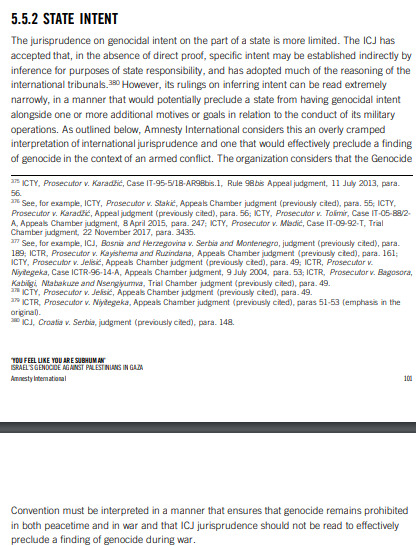
Nope.
One court case that they don't even go into in the section. Also, this is it. This is their entire section admitting that they disagree with the accepted definition and legal standard of genocide, that they are expanding it to encapsulate their standards, don't explain what those standards are, and cite one case that maybe supports their position.
One citation to support changing the definition and the legal framework surrounding it 101/102 pages into an almost 300 page document.
Any lawyer could easily get this argument thrown out. Any professor would toss out your paper for this. Journals, editors, publishers...you'd receive scathing critical feedback for this alone.
One citation to support your position to change the accepted definition and standards of a highly impactful and devastating act because you "feel" that it is happening and the standard is too "narrow".
In fact, the report alludes to other experts and literature that supposedly supports their position, but it is not included in this section that stands at the core of their argument. It's almost like finding people who also feel the same way are not actually evidence in the eyes of accepted standards, precedence, and evidence based practices and policy.
It'd be like someone in entomology saying they think spiders are actually insects because they feel that the definition of insects is too narrow, providing one citation, not explaining why that citation supports their position, and ignoring the whole body of literature that states otherwise.
And that's been my problem with the position of a lot of anti-Israel groups and individuals. It has been a subjective position based upon them feeling like this conflict is the worst thing ever and thus must constitute a genocide. There's a reason even the ICJ deemed it not a genocide but a conflict that could potentially become one.
Creating a report that is predicated on changing the definition of "genocide", burying the lede on the intention of doing so, and then (likely) having another country petition to change the definition based upon your report is shady behavior. We would all call it out if it was some Right Wing organization in the USA doing it towards another country, organization, or what have you. But again, Israel and, by extension and affiliation, Jews are held to a different standard than anyone else. That is what makes so many of these organizations and their actions antisemitic. None of this effort to goalpost and change the rules and definitions happens for any other country or people.
Only Israel, Israelis, and Jews.
And we know what happens when that occurs.
#jumblr#antisemitism#leftist antisemitism#intersectional antisemitism#Amnesty International#Amnesty International trying real hard to hide its antisemitism behind a big report and jargon
202 notes
·
View notes
Text
What these freaks did to those kids is cruel and unusual.
Madagascar will surgically castrate paedophiles under new law approved by MPs it is revealed - days after Kazakhstan announced same plan
A minister spoke in favour of the law saying: 'society must know what they did'
By ED HOLT
PUBLISHED: 14:29 EST, 7 February 2024
Madagascar's parliament has approved a new law which will see paedophiles surgically castrated for their crimes.
The new law comes just days after Kazakhstan announced a similar law where the country's worst offending child sex offenders will have their genitals surgically removed.
On February 2 Madagascar's parliament, The National Assembly, approved a law which legalised the castration of child rapists.
The old law stated that those found guilty of raping a minor would face between five and 20 years of forced labour.
However, this new law states that those found guilty of raping a child under ten-years-old will be surgically castrated and sentenced to life imprisonment. While if the victim is between ten and 13-years-old, they will instead be chemically castrated and face 15 to 20 years of forced labour. If the rapist is also a minor they will escape castration.

Madagascar's Minister of Justice Landy Randriamanantenasoa spoke in favour of the bill. She said: 'Society must know what they did and who they are'
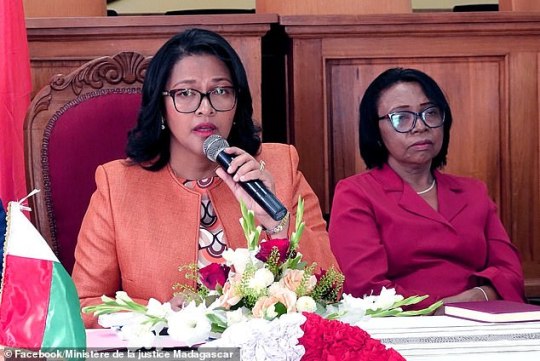
Ms Randriamanantenasoa has rebuked similar criticism about respect for human rights by saying Madagascar is a sovereign country. This comes after Amnesty criticised the bill
Minister of Justice Landy Randriamanantenasoa spoke in favour of the bill. Le Quotidien, a French language newspaper, reported that Ms Randriamanantenasoa said: 'Society must know what they did and who they are.'
The bill was proposed by the President of Madagascar, Andry Rajoelina, last month and was one of his key campaign promises during his re-election bid last year.
International organisations have criticised the new law. The BBC reports that in a statement, Tigere Chagutah, Amnesty's regional director for east and southern Africa, said: 'In Madagascar, rape cases remain under-reported, and perpetrators often go free due to the victims' and their families' fear of retaliation, stigmatisation, and a lack of trust in the judicial system.
'Implementing chemical and surgical castration, which constitutes cruel, inhuman and degrading treatment, as a punishment for those found guilty of raping minors will not solve this and is inconsistent with Malagasy constitutional provisions against torture and other ill-treatment, as well as regional and international human rights standards.'
Ms Randriamanantenasoa has rebuked similar criticism about respect for human rights by saying Madagascar is a sovereign country.

The tighten of the law in Kazakhstan follows the death of Erkezhan Nurmakhan, five, who was lured to a paedophile's house after he offered her money for an ice cream
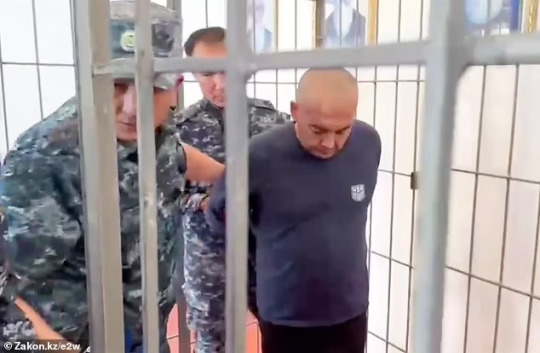
Saidolim Gayibnazarov, 48, who had previous convictions, was sentenced to life in jail and chemical castration
Kazakhstan announced its own draft law to remove paedophiles genitals on February 6 following complaints from MPs that the current law where paedophiles are chemically castrated was not deterring child sex offenders.
The tighten of the law follows the death of Erkezhan Nurmakhan, five, who was lured to a paedophile's house after he offered her money for an ice cream.
Saidolim Gayibnazarov, 48, who had previous convictions, was sentenced to life in jail and chemical castration.
Deputy Interior Minister of Kazakhstan, Igor Lepikha, said surgical castration was 'controversial'.
'In terms of ethics and the human side of the issue it is very complicated indeed.
'Moreover, we speak about these criminals being locked up for life - so there is no point in [castration] then.'

#Madagascar#Kazakhstan#Madagascar's Minister of Justice Landy Randriamanantenasoa#President of Madagascar Andry Rajoelina#Of course Amnesty would criticised the bill#Shut up Tigere Chagutah#Rest In Peace Erkezha Nurmakhan age 5
460 notes
·
View notes
Text
by Michael Rubin
Hamas paraded three Israeli hostages before cameras prior to turning them over to the Red Cross on Feb. 8. The three were emaciated like concentration camp survivors. They may have been the lucky ones. Hamas meanwhile delays the release of a dual Russian-Israeli citizen due to his health. The hostages did not learn about the deaths of their loved ones on Oct. 7, 2023, until their release. Nor was the starvation of prisoners the only Holocaust parallel. Just as the Nazis did, Hamas executed special needs children and babies it had seized during its invasion of Israel.
Biden’s team recognized but would not lift a finger to rectify the ICRC’s Jewish exception, even though several of those hostages were Americans.
A core function of the International Committee of the Red Cross is to visit and monitor prisoners. Historically, the ICRC would visit Israeli prisons. After it neglected to visit Jewish hostages in Gaza, Israel suspended its access. That the Red Cross made a greater issue about such suspensions while Hamas tortured, abused, starved, and, in some cases, executed Jewish civilians in its custody suggests that the Red Cross considers the welfare of Jews to be an exception to its mission.
Less than two weeks after Hamas seized more than 200 men, women, and children, President Joe Biden said, “I asked Israel that the global community demand that the International Red Cross be able to visit hostages. I just demanded that the United States fully — a just demand that the United States fully supports.”
Yet, when Israel made the demand and Hamas rejected it, the White House continued channeling hundreds of millions of dollars in aid to ICRC. The message was clear: Biden’s team recognized but would not lift a finger to rectify the ICRC’s Jewish exception, even though several of those hostages were Americans.
Had Biden withheld funding to the ICRC until the group visited all hostages, Mirjana Spoljaric, a Swiss diplomat who heads the group, may not have been so willing to throw Jews under the bus for the sake of the group’s good relations with Hamas. Instead, the group continues to allow Hamas to subject Jewish women to harassment and abuse upon their release. Moral clarity and backbones matter.
Alas, the ICRC’s willingness to sacrifice its mission upon its antipathy toward Jews is not a one-time occurrence. It took the ICRC headquarters more than 75 years to recognize Israel’s Magen David Adom’s chapter because of objections over its Jewish star. It had no trouble recognizing the Islamic Red Crescent, however.
Nor is the ICRC alone. The United Nations Relief and Works Agency effectively became an enabler of Hamas terrorism, if not a Hamas arm. Its employees participated in the Oct. 7, 2023, massacre. Its hospitals doubled as Hamas command posts. And released hostages said they were kept at times in UNRWA facilities. Yet, its commissioner-general Philippe Lazzarini, an ICRC leadership alum, deflects criticism and accountability. Instead, he seemingly embraces the ICRC’s Jewish exception.
ICRC rot runs deeper. Agnes Callamard, the secretary-general of Amnesty International, cited ICRC’s Israel denunciations to justify her own advocacy for Hamas.
Antisemitism remains the world’s oldest hatred, and Jews are the canary in the coal mine. Antisemitism’s victims are not just Jewish, however. The institutional antisemitism and embrace of a Jewish exception in international organizations such as the ICRC and the U.N. erode their moral standing.
Israeli Foreign Minister Eli Cohen was right when, in 2023, he said the Red Cross had “no right to exist” if it did not visit the hostages in Gaza. His only error was he did not go far enough. The moral bankruptcy not only of the ICRC but also of organizations ranging from UNRWA to the United Nations Educational, Scientific and Cultural Organization to the United Nations International Children’s Emergency Fund raises questions about whether it is time to cull them.
84 notes
·
View notes